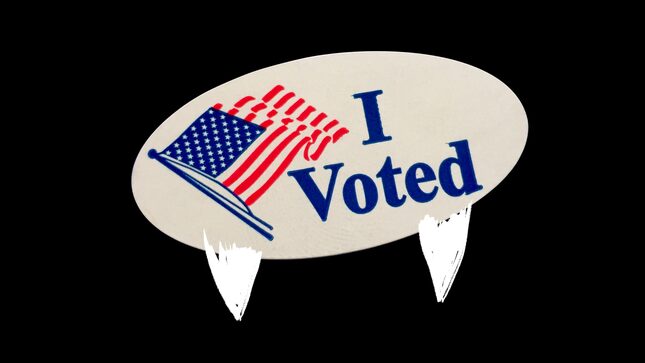Inside Project Veritas's Cynical, Transphobic Outing of a 65-Year-Old Fast Food Worker
In DepthIn Depth
Image: Jim Cooke
Vincent Marzello didn’t expect to be chatting with a stranger. The 65-year-old from West Lebanon, New Hampshire, sat at a computer in his local library, where he could get 30 minutes of internet, his only real online access. As Marzello remembers it, a youngish, blonde man struck up a conversation: he was from California, had just moved to the area. Then the man suddenly pivoted, musing aloud that he might have voted twice. An odd thing to mention to someone you’d just met; a confession to a crime, really. Marzello got the man’s phone number but never saw him again.
In hindsight, it was preposterously weird. A little over a year earlier, in 2019, Marzello had met with investigators who’d accused him of voting twice in the 2016 general election. He told almost no one about it. Of course, it wasn’t mere coincidence. It was the latest ham-fisted stunt from right-wing activist outfit Project Veritas; Marzello later identified the blonde Californian as Christian Hartsock, a longtime operative with the group (who’s recently been spotted in Wisconsin trawling for voter fraud). That strange meeting in the library was just the beginning of the attack by Veritas—with its billionaire funders and multimillion-dollar budget—targeting a transgender senior citizen living paycheck to paycheck on fast-food wages.
That attack has now reached its climax. Last week, Project Veritas had an on-camera meeting with New Hampshire’s deputy attorney general and the head of the state’s Election Law Unit. James O’Keefe, the organization’s founder and CEO, presented a hidden-camera video of Marzello describing how he’d voted twice in 2016. Later that same day, the attorney general’s office reportedly decided to prosecute Marzello. State police arrested him the next day.
Project Veritas hurriedly released its footage from this drama, boasting that “just a little more than 24 hours since we raised the issue,” Marzello had been taken to jail. The attorney general’s office was not shy in admitting pressure from O’Keefe’s group had led to the arrest. Meanwhile, the man at the center of it all, Vincent Marzello, wondered whether his life was ruined.
With its brief moment of mainstream respectability long behind it, Project Veritas has fully turned to the lucrative world of conservative propaganda-making. (As of 2018, O’Keefe made nearly $400,000 a year running the organization, while its total fundraising in 2019 was more than $13.44 million.) Lately, that’s meant Trump-supporting covid-19 denialism and, as we’ve previously reported, trying to delegitimize mail-in voting as part of a larger Republican effort at voter suppression and, in a more innovative twist, preemptively cast doubt on the results of the 2020 election. That’s up to and including President Trump’s recent recommendation that North Carolina residents vote twice, once via mail and again in person, to see whether anti-fraud efforts are “as good as they say.”
In the course of reporting that story, we received documents detailing Veritas’s next “sting.” In one, O’Keefe promised, “Our election bombshells are coming soon. The first election story is coming out September 8th at the highest levels of corruption.” The grammatically challenged claim appeared as a postscript in an email to one of the group’s most generous and engaged donors, billionaire industrialist Robert “Dr. Bob” Shillman.
Among other right-wing causes, the Shillman Foundation has funded the work of William Kilpatrick, a former professor of educational psychology at Boston College who has argued that transgender activism is a “fad” and transgender identity a “lie” about which “the rest of us are expected to collude.” That perspective aligns nicely with the recent Republican Party line. During the 2020 Republican National Convention, for example, Cissie Graham Lynch, granddaughter to the late televangelist and prominent homophobe Billy Graham, reminded convention viewers that Democrats under “the Obama-Biden administration” had “pressured schools to allow boys to compete in girls sports and use girls locker rooms.” Transphobes, in this worldview, are under siege.
A second document seemed likely to be among the bombshells promised to Dr. Bob. An “AAR”—an “after-action report”—by operative codenamed “Magnum” with an assist by “Peter Pan” (yes, they do use this spy-cosplay jargon) transcribed a hidden camera video of a Project Veritas operative confronting Marzello and, after some perfunctory small talk, leading him to say he’d voted twice in 2016.
-

-

-

-

-

-

-

-

-

-

-

-

-

-

-

-

-

-

-

-

-

-

-

-

-

-

-

-

-

-

-

-

-

-

-

-

-

-

-

-








































